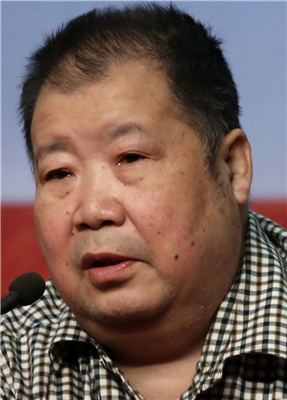Source: China Daily (12/17/18)
Literati mourn author of ‘Emperor’ series
By Yang Yang | China Daily

Ling Jiefang. [Photo provided to China Daily]
Ling, who was dean of the College of Liberal Arts at Zhengzhou University in Henan province, was best known for his Emperor series, which was released between 1989 and 1996, and consists of 5 million characters.
After his death, fans shared a couplet-a traditional form of two-line poetry-that includes the line, “Er yue he kai ling jie fang”, which translates as “The Yellow River’s frozen surface breaks in February, the ice is liberated.”
The poem, which quickly went viral, cleverly combines the author’s birth name and pen name.
Nobel laureate Mo Yan created a version of the couplet and shared an image of it written in calligraphy to mourn the nation’s loss.
Ling began writing his first novel, The Great Kangxi Emperor, in 1984 and later published Yongzheng Emperor and Qianlong Emperor as part of the same historical fiction series. The hugely popular books follow three generations of leaders during the Qing Dynasty (1644-1911) and feature tales of corruption, invasions and rivalries between royal siblings.
All three novels were adapted into popular TV series in the late 1990s and early 2000s starring bigname actors including Chen Daoming, Tang Guoqiang and Siqin Gaowa.
In an interview with Beijing News on Saturday, writer Zhou Daxin said Ling was inspired by A Dream of Red Mansions at a young age and had spent many years studying the classic work before starting on his own novels.
“As a result, unlike many works by historical novelists, Eryue He’s fiction had his own characteristics,” he said. “He injected lots of his own emotion and life philosophy into his work.”
Zhou said Ling’s vivid depictions of the Qing Dynasty helped people learn the history of the time.
Because of his detailed research into corruption in the Qing court, Ling was regarded as an expert on the topic. In 2014, the Central Commission for Discipline Inspection, the top anti-graft watchdog, invited him to be the first guest speaker for an online program called Listen to Masters.
An eye disease caused by diabetes meant Ling was unable to read or write for long periods, but he continued to talk about corruption, including problems faced in recent years.
“The anti-corruption campaigns are unprecedented in terms of investigative scope and effort exerted,” he told Xinhua News Agency in 2017. “I would think about the social phenomena that I observed and use my influence to make my contribution to the solutions.”
He said that corruption existed not only among the rich and powerful but was a universal social phenomenon fueled by consumerism.
The solution to corruption is education, Ling said. “Read books and newspapers carefully, and learn to live well,” he added.